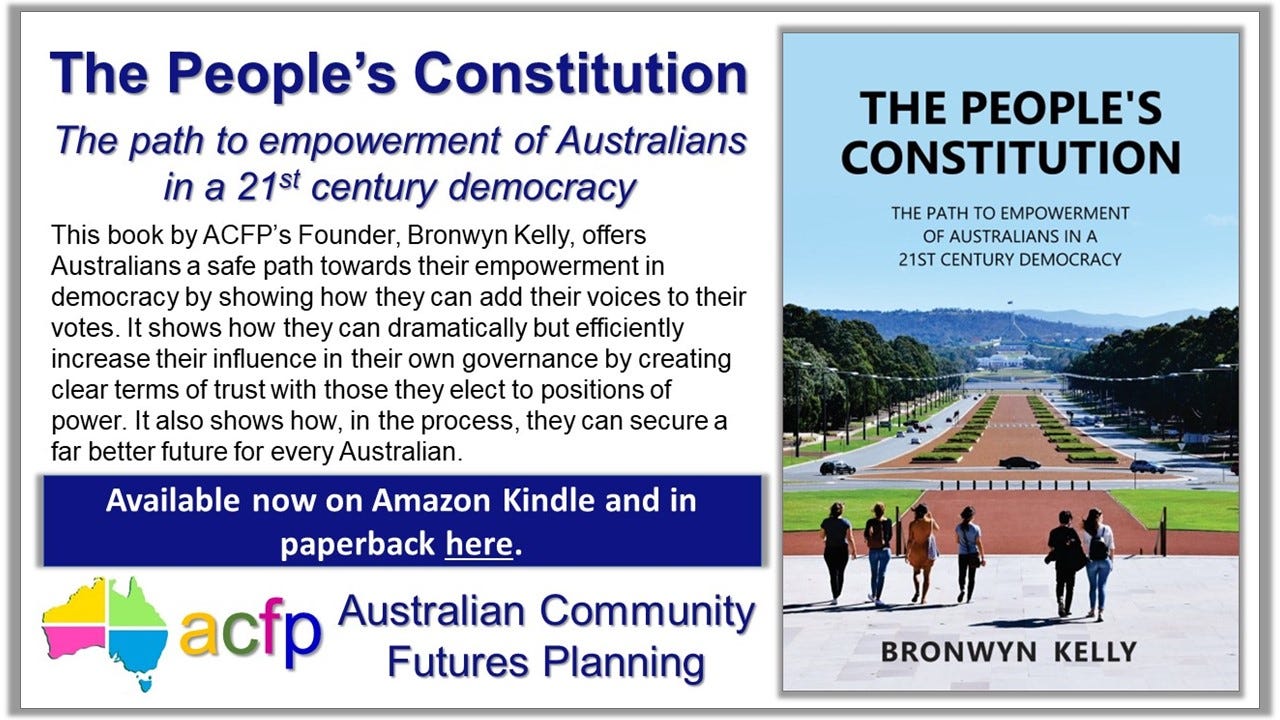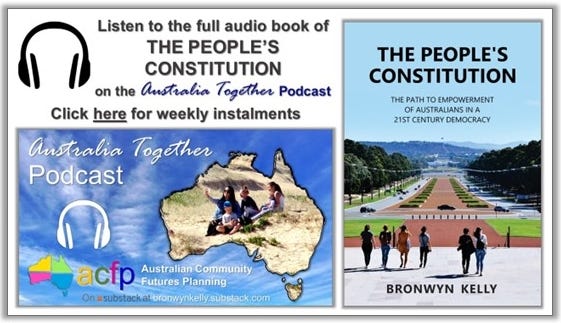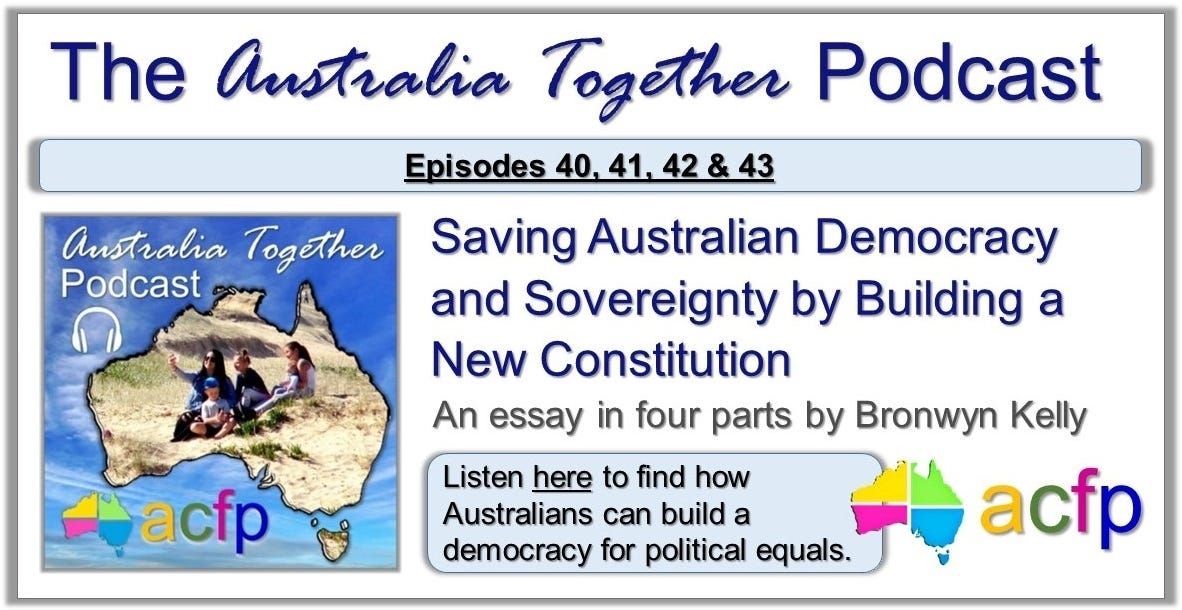So it's out in the open at last - the Crown is the enemy of the People.
Australians need to build a democratic state in which the people are acknowledged as sovereign.
In the Commonwealth’s prosecution of whistleblower David McBride for his disclosures of possible crimes by Australian soldiers in Afghanistan, the Crown has (to date) been successful in arguing something that will surprise most Australians – that being that an Australian soldier does not serve Australia, or the Australian people or the public interest. Instead, a soldier’s oath obliges him or her to swear to do nothing more or less than to “well and truly serve [only] Her Majesty Queen Elizabeth the Second, Her Heirs and Successors according to law,” and to “resist Her enemies.”
As the Crown prosecutor Trish McDonald submitted:
To interpret [the word] ‘serve’ to mean to act in the public interest, is to turn on its head service to king or queen.
“Nowhere in the oath” she said “does it refer to public interest or that a soldier must act in the public interest.” Ms McDonald added that, “If it were [an oath to act in the public interest], Parliament would have said so.”
This amounts to an argument that the oath of enlistment in Australia’s armed forces is an oath to act against the public interest whenever it is contrary to the current monarch’s interest, or when she or he simply orders armed forces personnel to do so. The implication is that by taking the oath a soldier is being offered a strictly binary choice between essentially opposed entities and there is only one choice they can make. They must choose to give their loyalty fully to a foreign monarch, not to the Australian people. So in Ms McDonald’s line of argument a soldier can’t choose to serve both, and in taking the oath must desert any loyalty they might have had to the public. They must turn their loyalty to the public on its head (as Ms McDonald might put it.)
This breathtaking display of disrespect by the Commonwealth for the people of Australia and the soldiers who seek to serve them should act as a wake-up call for all Australians about the nearness of their democracy to extinction.
Common assumptions in Australia’s democracy, such as it is, generally include one that suggests that the sovereign derives its authority from the people. Constitutional lawyer Helen Irving has assumed as much by saying that,
The Constitution rests upon the sovereignty of the people … their consent is the ultimate authority for government … and a core part of the principle of democratic sovereignty is that power must not be derived from another source.
This would imply that under our Constitution the people are a higher authority than the Crown and that the Crown must defer to their interests. However, that assumption has now been unmasked as one that is at present not shared by either the Crown or its appointed Executive (that is, the council of select ministers advising the governor-general). On the contrary, the Crown and the Executive quite clearly have an interest in ensuring that the Crown is the higher and indeed the sole relevant authority in our democracy, regardless of the people. In other words, the Crown itself (whether it takes the form of a king, a queen or an executive government) now assumes it has no obligation to serve or protect the people. It has no obligation to anything other than itself. And by extension the Crown’s implication is that its armies have no obligation to the people and their interests.
Worse than that, something extra that is truly dreadful emerges from Ms McDonald’s arguments – at least if we have an idea that the Crown is there to protect and defend the people and their interests. If she and the court interpret the oath to mean that “to act in the public interest is to turn on its head service to king or queen”, then both she and the courts are declaring that one of the “enemies” the armed forces are bound by their oath to defend the Crown against is the people themselves. It is now out in the open that Australia’s armed forces aren’t there to protect and defend Australians, they’re there to protect and defend the king or queen of a foreign country no less, and more than that, to take up arms against the people if she or he orders them to do so.
Ever since the British cut off the head of a king in 1649 and Thomas Hobbes responded in his book Leviathan: or the matter forme and power of a commonwealth ecclesiastical and civil by proposing a form of state in which a deal could be worked out between kings and parliaments that would safeguard the heads of both the king and executive governments – ever since then, the people of the British commonwealth have been vulnerable to attack from their own state. It would seem it has been lawful all this time for a monarch to commit the crime for which Charles I was actually beheaded. He was executed because he was found “guilty of High Treason and of the murders, rapines, burnings, spoils, defilations, damages, and mischiefs to this nation”. He was beheaded for raising the standard against and causing the bloodshed of his subjects during the civil wars of the 1640s.
So in the 1640s it was the most grievous crime possible for a sovereign to organise armies to act against the people and by extension the interests of the public. It was a crime grievous enough to justify a judicial decision to kill a king. But it would seem that it’s not a crime anymore, at least according to the Crown and perhaps the ACT courts. The rise of the Hobbesian modern state is a pact between the Crown and the Executive against the people. In Australia it has apparently given rise to a form of state which has embedded the people as the enemy of both the governments they elect and the kings they do not. If it was high treason in the 1640s for a monarch to raise an army against the people, it would seem it is no longer.
This implies something that no Australian soldier who has grown up in what we have assumed to be a democracy would have been likely to fully consider when taking the oath to serve the Crown. And if any did consider it and took the oath anyway, then we might worry about their fitness to serve in defence of Australians. When swearing this terrible oath – an oath to defend to the death not the interests of the people of our state but those of a foreign monarch, an oath to “resist Her enemies” with lethal force should she (or her executive) so arbitrarily demand – when swearing as much, did those Australians taking the oath think that they were swearing to be ready to kill Australian citizens or act against their legitimate interests, if so ordered?
It is likely that they would have thought they would be required to kill non-citizens whose actions might be threatening the legitimate interests of Australians. But it is unlikely that many soldiers who have faithfully sworn this oath were advised of the obligations implied by Ms McDonald – that, if so ordered, they would be required unquestioningly to turn their weapons on the citizens of Australia or engage in other acts of commission and omission that could plunge the people and their legitimate interests into the abyss. This is the implication of the oath of enlistment that we must now consider if Ms McDonald is right about our rule of law. Soldiers who might enter the army precisely because they want to give their all to serve the public interest – soldiers who might enlist because for them a meaningful life consists in their willingness to make the ultimate sacrifice for the people of Australia – those soldiers would be very likely to conclude that their lives were wasted if their sole duty was to a foreign monarch and not to the public as well.
But, as if this is not bad enough, we should also be attentive to the fact that the oath parliamentarians are forced to swear before they can take up a seat offered by the people in a democratic election, is mostly identical to the oath for the armed forces. It too forces those who might seek office to further the public interest to swear no more than that they “will be faithful and bear true allegiance to Her Majesty Queen Victoria, Her heirs and successors according to law.” There is nothing in the oath for elected parliamentarians that mentions the public interest.
And now that we have seen a Commonwealth prosecutor push arguments on the court that basically suggest both parliamentarians and soldiers must disregard the public interest if the Crown or the Executive says so, it is clear at last that the form of state extant in Australia is one in which force is ranged against the people. Military and executive force is not for their protection or even for the protection of their duly elected parliaments. It is designed to ensure that the military – like passive drones with no human ties – will work in the service of the state against the people. Ms McDonald’s argument (at least for the moment) has prevented armed service from being “turned on its head against king or queen”, but in doing so she has turned the raison d’etre of our state on its head. Australians may have come together to form a nation in 1901 because they assumed this would establish a form of state capable of protecting them and their interests. But as it’s turned out, the opposite form of state has been imposed on them.
Looking at all this in the light of Ms McDonald’s argument, it is apparent that the Hobbesian modern state is formed that way precisely because the thing a sovereign naturally fears most is the people of the state. Hence the need to dragoon armies of those people into servitude to the Crown rather than service to the people.
Trish McDonald was dead right when she argued that, “There is nothing so dangerous to the civil establishment of the state as an undisciplined or reactionary army.” She was smart to build on this to argue further that if soldiers were allowed any duty, other than to obey orders, the result would be an undisciplined army that does not recognise the authority of the monarch. Charles I and other feeble monarchs before him found that out to their peril. But no monarch or executive since has wanted to suffer the same fate. So, now Australians might need to think about what this all means for them. Who will serve them if the armies they pay for and the executive governments they elect aren’t obliged to, or simply won’t, because the will of a sovereign that they do not elect is to line up that army against them?
Good questions, all of which arise because of the Crown prosecutor’s candid admissions of the heinous purpose of our arrangements of state. But for these good and timely questions we should thank not the Crown prosecutor but the wonderful David McBride. Hopefully, because of his integrity and bravery, it is not too late for us to face them and build a truly democratic state in which the people are sovereign.
More information about why Australia needs to build a truly democratic state where the people are acknowledged as sovereign can be found in my latest book, The People’s Constitution: the path to empowerment of Australians in a 21st century democracy, available in paperback here and on Kindle here. Or click on the picture below. Or visit the Australian Community Futures Planning website to purchase The People’s Constitution at https://www.austcfp.com.au/publications
Or listen to the audio version of The People’s Constitution on Apple podcast here.
Listen to the new essay on how Australians can save their democracy
Click on the image below to listen to a new major essay of Saving Australia’s Democracy and Sovereignty by Building a New Constitution. Or view the full transcript of the essay here.
Find out all about ACFP
Become involved in building plans for a better Australia here.








Thank you Bronwyn for the article. Exactly that way that I had read it but just wish to add that the argument also states that not only does a soldier have a duty to the monarch or representatives but also a sole duty to the orders/actions of immediate supervisor....effectively contradicting the Nuremberg trials resolution where many defendents used the excuse of 'not guilty because I was only following orders', cheers
Thank you Bronwyn - you have illustrated in a simple fashion how the British monarchy, its Crown government, and its elites have effectively taken control of the Australian nation that our family's forefathers hacked out of the wilderness, and as usual and in the standard British way, they've done it by being sneaky, treacherous and corrupt - What is most interesting about this issue and the points you raise is that it applies to Britain itself, to all of the British Commonwealth nations and to the European nations that still have their Roman Catholic Church monarchies, which is the source of the governments we call The Crown - it exists all over Europe. And so the Roman Empire families of Britain and Europe, and their monarchies maintain control over their nations as if they were still absolute monarchies and apply it to their colonies, which are pretending to be independent. France still rules many nations in Africa through its central banks! Another monarchial era construct for wealth extraction.